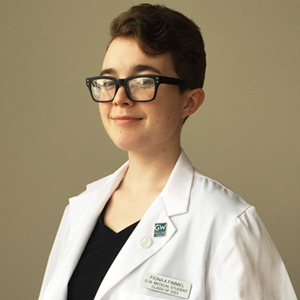How to get into med school with a post-bacc linkage program

It’s been an exciting year for Fiona Fimmel. In June 2019, she became the first post-baccalaureate student from Northwestern University’s post-bacc pre-med program to be accepted into medical school using one of Northwestern's new medical school linkages. Medical school linkages are special relationships between a post-baccalaureate premedical program and a medical school. The primary advantages of pursuing linkage program acceptance are early notification of conditional acceptance before the completion of the post-bacc program and elimination of a glide year between the completion of the post-bacc program and beginning medical school. Many post-baccalaureate linkage programs are listed in the Student Doctor Network (SDN), a popular resource for future medical students and healthcare professionals.
From history and economics to medicine
While in undergrad, Fiona studied history and economics. As a result, entering into a premedicine program was exciting but scary for her. Fiona admitted “It was rough at first, coming from having taken a total of three science classes in undergraduate.” However, she was up for the challenge, knew that the challenge was necessary, and shared that her professors and advisers were there for her every part of the way. Fiona gushed “The professors were great. I cannot recommend them enough.” She further emphasized, “the great thing about the program was that we kept more or less the same professors for most of our cycles, so I got to form a connection with them in a way that I really couldn’t as an undergrad.”
Preparing for medical school with the highly regarded Northwestern science curriculum
Students in Northwestern's premedicine post-baccalaureate certificate program complete the laboratory science courses in biology, general and organic chemistry, and physics required for the application to most medical, dental, veterinary, and related professional schools.
The highly regarded Northwestern curriculum and faculty offer students the opportunity to build a deep and strong science foundation. The premedical coursework is primarily offered in evening classes, and can be completed in 12, 15, or 21 months, depending on the student's needs. This program is designed for career changers and students who have not completed the coursework needed to apply to medical school
Not a typical student: getting into Med school with a post-bacc linkage program
As a career changer, Fiona admitted that “there’s this stereotype we have about the typical premed student who knew from the very beginning that they were going into medicine and they skew their entire lives toward it. Then when you don’t fit into that hole, it can be really scary to try to pursue it. You’re like well, I haven’t always wanted to be a doctor, and I didn’t love science when I was in high school.”
As someone who started in the humanities, she too felt that pressure but learned along the way that “for the most part, unless you’re in radiology or cardiology or some specialty like that, courses like physics are more training for your brain, a signal of your ability to absorb and synthesize a large amount of quantitative information. It’s not actually about the physics, so it doesn’t matter if you’re not passionate about physics, you can still be a doctor, a good doctor.”
Northwestern’s post-bacc premed linkage programs
The post-baccalaureate program at Northwestern currently has linkage agreements with Northwestern’s Feinberg School of Medicine, George Washington University School of Medicine and Health Sciences, and Rutgers School of Dental Medicine.
After an intensive application and interview process, Fiona first found out in January that she was accepted into George Washington under a conditional agreement. Before receiving final confirmation, she had to successfully finish her premedicine coursework, achieve the required GPA, and score at least a 510 on her MCATs—which she did with ease. After submitting those final pieces, Fiona was thrilled when she was notified that she would officially be a medical student at George Washington, starting at the end of July.
When asked how the science curriculum at Northwestern prepared her for the MCAT, Fiona without hesitation stated “it way over-prepared me, in a good way. I’m sure that there were questions that the MCAT could have thrown at me that I only would have been able to answer because I took specific classes with professors who taught at a distinguished level.” She further explained, “I actually took the MCAT before I had really taken any biochemistry. My biology and organic chemistry background was more than enough to get me a very good score on the MCAT.”
Looking to the future and planning for med school
What is Fiona most excited for once she’s at George Washington? “The emphasis on holistic and social medicine.” She is also looking forward to the opportunity to receive clinical experience early in her medical school career, an aspect that George Washington prioritizes. Northwestern University School of Professional Studies is proud of Fiona’s journey and cannot wait to hear about the incredible work that she brings to her new school.
Check out the SPS website to learn more about the Northwestern University pre-medicine post-baccalaureate program.
